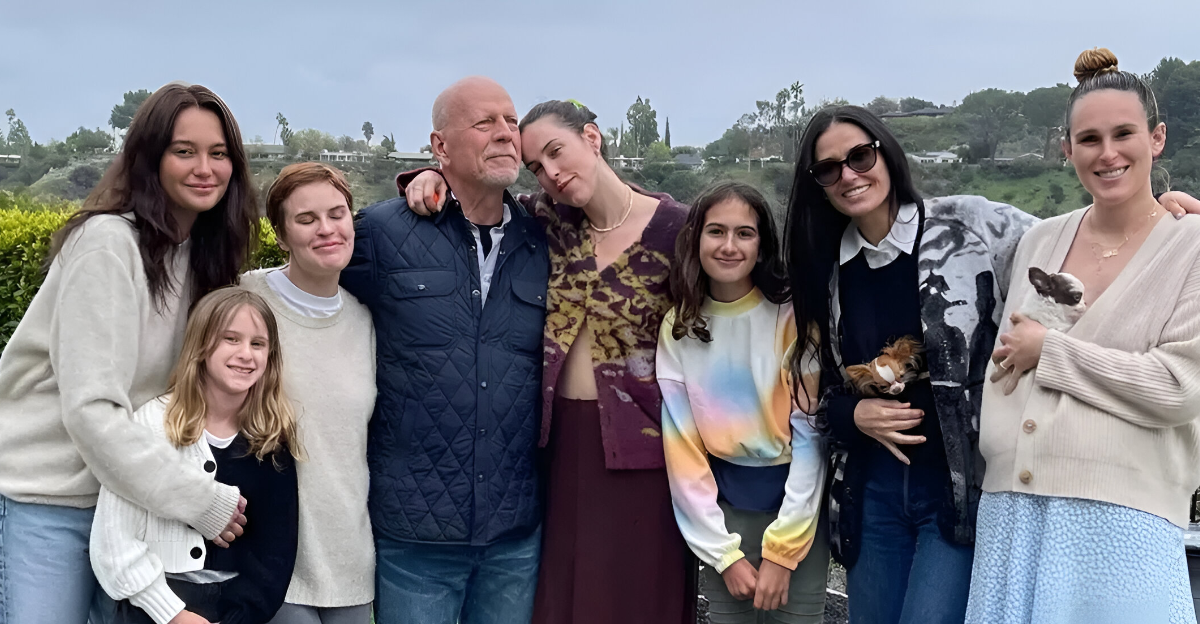
Hollywood actor Bruce Willis’ family is facing growing internal tension due to concerns about the management of his $250 million estate.
According to Radar Online, his wife, Emma Heming Willis, now manages both his care and financial affairs after his 2023 dementia diagnosis. This transition has reportedly created unease among some relatives.
The Fortune in Question

Willis’ estimated $250 million fortune includes real estate, investments, and royalties earned over four decades in film and television.
Reliable reports indicate that control of these assets shifted to his wife as his illness advanced. Financial analysts say such transfers of authority often occur in medically complex households.
The Family Divide

The family’s structure spans generations. Willis shares three adult daughters with ex-wife Demi Moore—Rumer, Scout, and Tallulah—and two younger children with Emma Heming.
News outlets report that differences in expectations and communication about estate management have caused friction between the two family branches.
Medical Turning Point
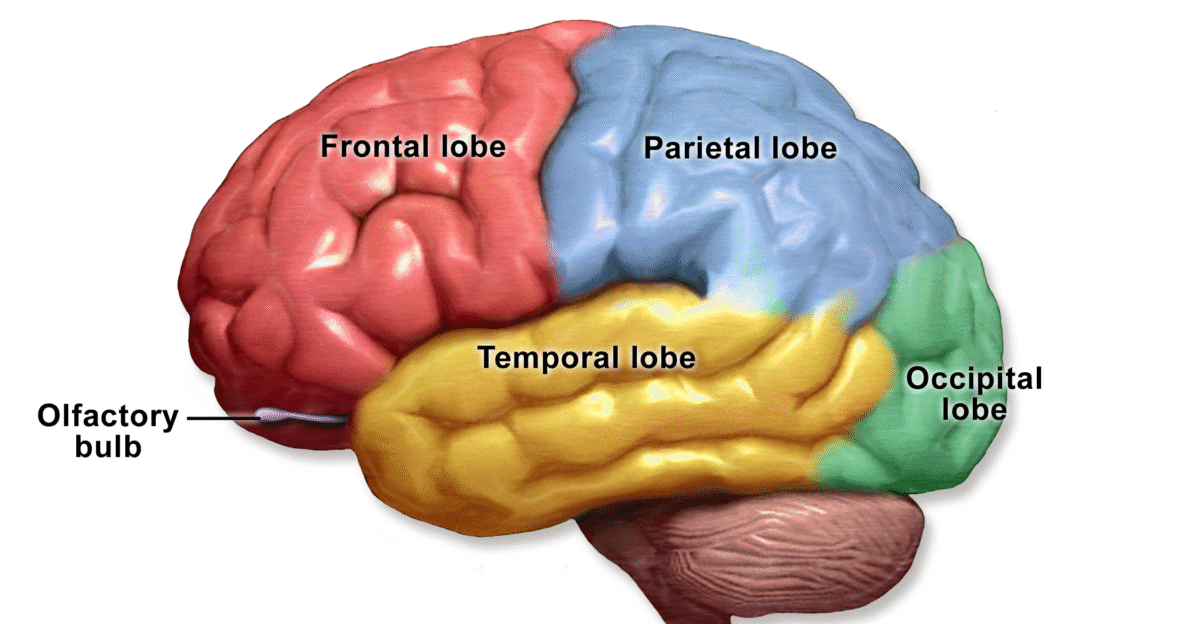
In early 2023, Bruce Willis was diagnosed with frontotemporal dementia, a degenerative brain condition that affects language and judgment.
Specialists say this diagnosis restricts his capacity to make complex decisions, requiring legal delegation of control to his spouse. His retirement and ongoing care arrangements were finalized soon after.
Power Shift Confirmed

By late 2024, legal and medical documentation reportedly identified Emma Heming as the principal authority for Bruce Willis’ estate and health decisions.
It is confirmed that this shift was part of a structured guardianship plan, suggesting it was authorized before public notice of his cognitive decline.
Care Home Transition

To support continuous medical treatment, Willis now resides in a specialized care facility in California. His wife remains the primary caregiver while maintaining stability for their young daughters.
Experts in elder care note that such arrangements are designed to balance emotional support with advanced medical oversight.
Blended Household Dynamics

The family’s blend of adult and minor children complicates financial administration. Estate planners say proportional inheritance discussions often become emotional under these circumstances.
While relatives have presented a united public front, sources indicate an increasing level of privacy surrounding key decisions.
The Cost of Health

The annual expense for full-time dementia care, including specialized residential facilities and continuous nursing support, usually ranges from $100,000 to $300,000 per year in the United States.
For families with substantial resources, such as those of Bruce Willis, these costs are manageable through structured estate planning.
Trusts and professional fiduciaries are commonly used to ensure sustained funding for care while safeguarding future inheritance and minimizing risks of financial mismanagement.
Managing Family Assets

Legal specialists note that medical guardianship frequently overlaps with authority to manage a family member’s assets and estate, especially in cases of mental incapacity. When decision-making is delegated to a guardian, it streamlines access to funds necessary for care, medication, and daily expenses.
This process typically requires court approval or detailed directives to protect the affected individual’s financial interests. However, experts warn that such arrangements may generate disputes among multiple heirs if asset transfers are not clearly structured or communicated.
Family tensions often arise from questions about transparency and fairness in asset management under guardianship. Ultimately, formal oversight and regular reporting are advised to minimize conflicts and ensure proper use of estate resources.
Legal Oversight

In California, professional fiduciaries managing the finances of incapacitated individuals must be licensed by the state’s Department of Consumer Affairs and operate under court oversight.
Legal experts note that conflicts between heirs and guardians are particularly common in estates involving ongoing intellectual property royalties or other creative-income assets, where valuation and control remain complex.”
Parallel Support Systems

Despite underlying tensions and concerns about Willis’ finances, multiple sources confirm that his entire family remains deeply involved in his care arrangements, prioritizing his welfare through regular collaboration.
Emma Heming Willis coordinates with a professional care team and facilitates frequent visits from Willis’ young daughters, ensuring meaningful interaction. Demi Moore and Willis’ adult daughters are also actively engaged, maintaining a supportive presence and unified front when confronting challenges.
Family members share responsibilities and participate in decision-making, thereby contributing to the overall stability of the family. Analysts note that such blended family coordination reduces duplication in medical oversight and enhances consistent monitoring of Willis’ condition. This cooperative approach fosters both practical care and public perception of continued unity.
Evaluating Transparency

Disputes over Bruce Willis’s estate center on concerns about transparency in financial management, particularly after authority shifted to his wife, Emma Heming Willis. Her dual role as caregiver and financial overseer has unsettled some family members who value apparent oversight of inheritance and expenditures.
Open communication about costs, power of attorney arrangements, and asset allocation is widely recognized as crucial for reducing friction in high-value estates.
When multiple heirs are involved and decision-making is concentrated, misunderstandings can quickly arise if financial information isn’t shared.
Estate Structuring Trends

Hollywood estates facing health challenges increasingly adopt dual-trust models, separating medical maintenance funds from legacy assets.
Estate analysts say this ensures immediate liquidity for care while reserving longer-term distributions for heirs. Industry observers expect the Willis family to take a similar path.
Emotional Dimension

Beyond finances, dementia profoundly reshapes family dynamics and emotional bonds within the household. Cognitive decline often leads to changes in personality, communication difficulties, and behavioral shifts, causing caregivers to experience emotional exhaustion and stress.
Bruce Willis’ family, as public figures, also faces intense scrutiny, which adds pressure to maintain privacy while navigating grief. The adjustment to new roles—for spouses and children alike—requires constant adaptation and emotional resilience.
Experts in cognitive disorders stress that caregiving can be isolating, compounding the family’s challenges. Despite this, moments of connection and joy remain vital anchors amid the roller coaster of dementia’s progression.
Financial Safeguards

Financial records show that Bruce Willis’s estate is managed through formal fiduciary oversight involving professional advisors who handle his long-term royalties and property income.
This system ensures compliance with California trust law, which mandates transparent accounting and annual reporting to prevent mismanagement and uphold beneficiary interests.
The Importance of Early Financial Planning

The Willis case has reignited discussion around the vulnerability of entertainment industry wealth during prolonged medical decline.
Industry observers emphasize the importance of early financial planning to ensure seamless control transitions and maintain family harmony.
Emma’s Role
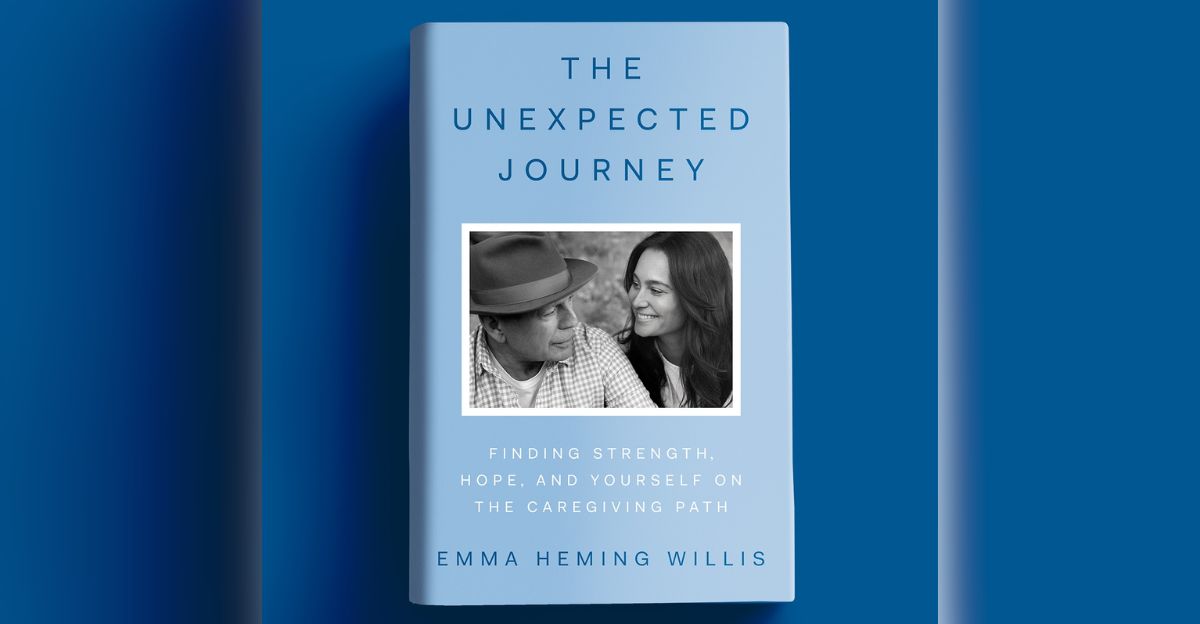
Heming has spoken at medical and caregiving events throughout 2025, emphasizing the importance of early detection, emotional support, and access to reliable resources in transforming how families manage degenerative conditions.
Her foundation work and writing, including the forthcoming book “The Unexpected Journey,” aim to empower caregivers and highlight the often-overlooked emotional and physical toll of these roles.
Partnering with brain health and Alzheimer’s advocacy groups such as the Women’s Alzheimer’s Movement and the Association for Frontotemporal Degeneration, Heming has helped drive national dialogue around caregiver burnout and the need for expanded healthcare resources.
Through these efforts, the Willis family’s experience has broadened the public’s understanding of dementia care, transforming a deeply personal hardship into meaningful social advocacy.
Legal Stability and Estate Planning

Combining spousal guardianship with professional fiduciary oversight is widely considered by financial experts to be among the most resilient models for long-term asset protection, especially in high-profile, high-net-worth estates, such as Bruce Willis’s.
This structure provides continuity in management, even as a family member assumes the role of primary caregiver, while third-party advisors offer financial discipline and ensure compliance with legal standards.
Professional fiduciaries help prevent mismanagement and maintain transparent record-keeping, which is crucial when ongoing income streams, such as film royalties and property earnings, are involved.
Shifting Norms in Caregiving
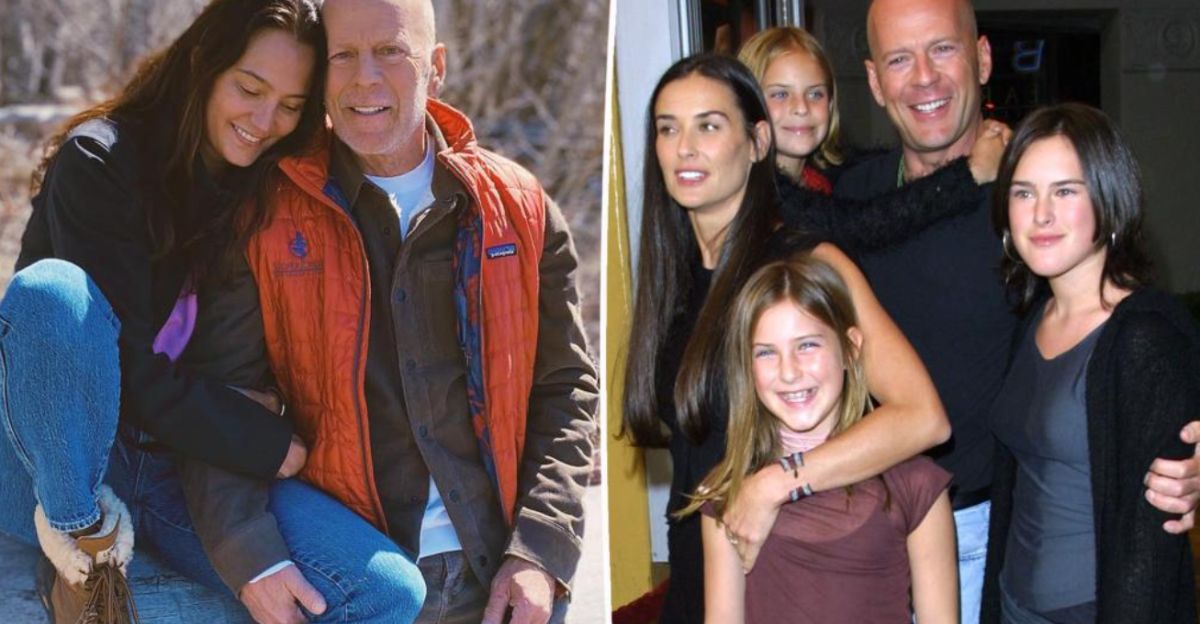
Observers are noting a rising awareness of blended-family caregiving and the unique challenges it presents. Families must balance private struggles with changing public expectations about elder care and intergenerational support.
Generational gaps can lead to differing values, emotional responses, and views on privacy when illness strikes. In celebrity households, the impact of fame compounds pressure and increases scrutiny of even routine family choices.
Caregivers also struggle to maintain emotional connections despite shifting roles and boundaries. Navigating stigma and seeking proper support remain ongoing issues for many, including those managing dementia care in the public eye.
Protecting Family Assets
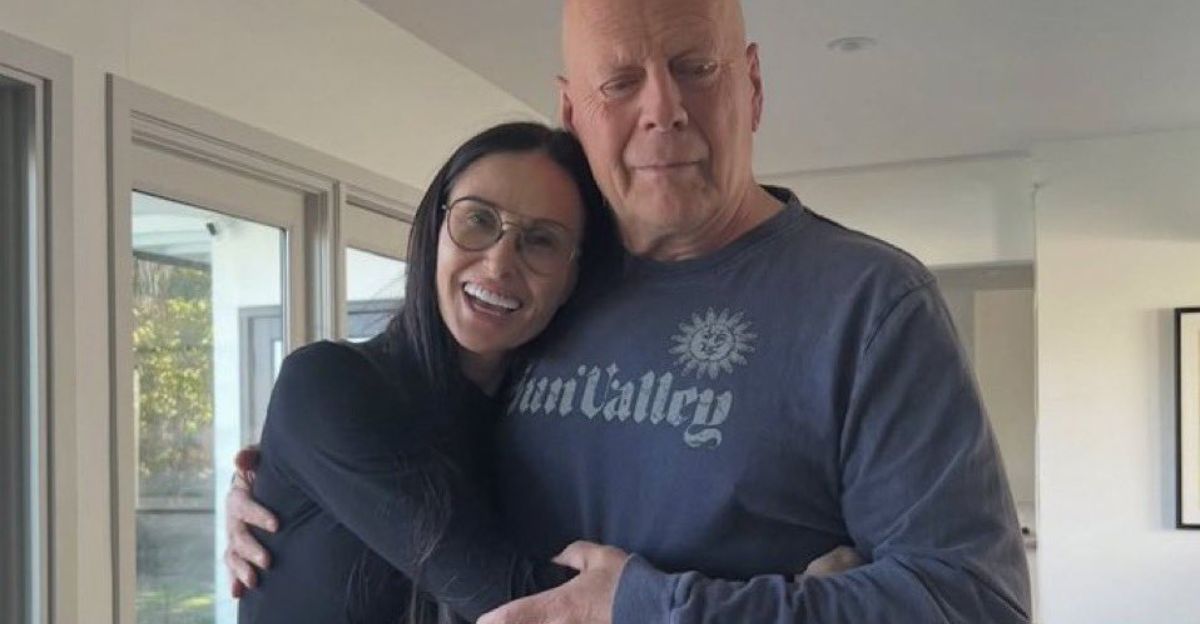
The Bruce Willis estate conflict serves as a poignant reminder for families facing illness and inheritance questions. Analysts emphasize the importance of planning early for incapacity and medical emergencies. Utilizing legal tools such as trusts and powers of attorney helps protect family assets.
Transparent decision-making reduces confusion and limits future disputes. Families who communicate about care, finances, and roles avoid many common pitfalls.
Willis’s situation underscores the value of acting with both discipline and compassion to safeguard legacy and relationships.